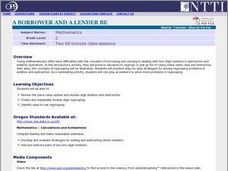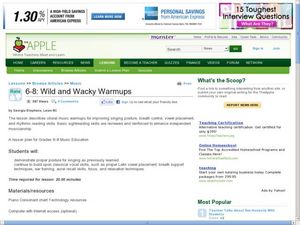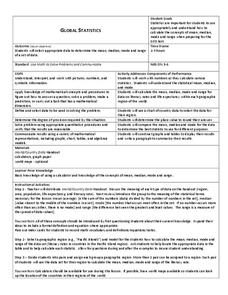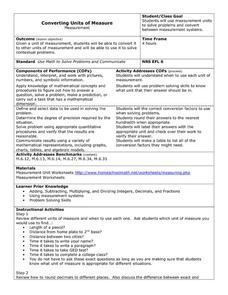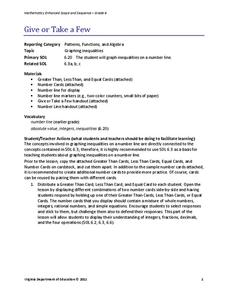Curated OER
Break the Code!
Seventh graders crack a code using binary numbers. In this technology lesson, 7th graders explain how binary codes can represent letters and numbers. They create their own code and exchange them with their classmates.
Alabama Learning Exchange
Watch That Plant Grow
Middle schoolers examine the growth of marigolds in a greenhouse environment. They chart data in spreadsheets showing plant growth over time and under a number of conditions. They record measures of plant height and greenhouse temperature.
Curated OER
Let's Trade
Second graders engage in a instructional activity which focuses on adding two-digit numbers and the regrouping process. They identify when the regrouping process is necessary and make appropriate "trades" to complete an addition problem.
Ohio Department of Education
Fraction and Decimal Equivalency
Mathematicians make representations of fractional parts of a whole and learn that a decimal is another way to represent a fractional part. Understanding is extended by comparing and ordering fractions and decimals on a number line. This...
Curated OER
Write Me Two Ways
Fifth graders write numbers in standard and expanded form. For this writing numbers in standard and expanded form lesson, 5th graders write integers up to billions in word form and standard form. Students use number cards to create...
Curated OER
Quad Squad
Students pretend they have visited a forest research station on an overnight field trip. They study forest fires, use compass directions, read maps, interpret imagery, and think about the impact of fire on ecosystems.
Curated OER
Powerful Patterns
Students use logical thinking to create, identify, extend and translate patterns. For this pattern lesson, students make patterns with objects, numbers, and shapes. Students extend and translate these patterns in several modalities...
Curated OER
Math Medicine
Young scholars solve real-world problems related to medical careers. They use graphical representations as part of the problem-solving process and work with fractions, decimals, exponents, and metric measurement. A demonstration is...
Curated OER
A Borrower And A Lender Be
Second graders practice addition and subtraction in this fun, technology-based Mathematics lesson for the second grade classroom. The lesson includes resource links, video clips, interactive websites, and a section for pre-lesson...
Curated OER
Percents: What's the Use?
Learners explore percentages in real world situations. In this percents lesson, students determine the final sales price after discounts. Learners interview community members and determine how percentages are used in the real world.
Curated OER
Percents: What's the Use
Learners research percentages in real world situations. In this percents lesson, students demonstrate their ability to apply percents to everyday situations. Learners communicate mathematically by conducting interviews about percents and...
Curated OER
Popcorn Geography
Students use kernels to create a "Top Corn-Producing States" map or graph. They read and round off numbers. Students identify on a U.S. outline map the location of corn-growing states. They create a visual (map or graph) illustration...
Curated OER
Wild and Wacky Warmups
Students explore vocal music techniques. In this vocal music lesson, students follow a series of warmup exercises modeled by the teacher, then participate in specific breathing and vocalizing exercises.
Curated OER
Global Statistics
Students determine statistics based on data. In this statistics lesson, students use data and record in charts. Students create graphs based on the statistics found.
Curated OER
Partial Quotients
Fifth graders examine the partial-quotients algorithm for finding the answer to a division problem. In this partial quotients lesson, 5th graders demonstrate the process of division through a series of estimations. Students examine the...
Curated OER
Empowered Barbie
Learners access prior knowledge of vocabulary on feminism and psychoanalytic theory, and gender schema. In this Empowered Barbie lesson, students recreate a Barbie doll. Learners write a reflection on how they changed Barbie's body and...
Forest Foundation
The Sustainable Forest
As part of their examination of forest ecosystems, class members examine how foresters, biologists, botanists, geologists, and hydrologists work to together to develop a management plan for sustainable forests.
Curated OER
American Colonial Life in the Late 1700s: Distant Cousins
Young scholars research how early colonists lived. They investigate late 17th century colonist's lives from Massachusetts and Delaware. Using their research, students write historical fiction in the form of friendly letters between the...
American Chemical Society
What is Density?
Density: the reason a giant pumpkin will float, but a tiny cranberry won't. Lesson begins with a demonstration of two of the same-sized cubes having different densities. Then pupils take eight cubes, each of the same size, and have to...
Curated OER
Helping Adolescents Deal with Peer Pressure
Designed by a mental health center, this presentation is meant to educate educators how to help teens face peer pressure. Tips are provided for identifying at-risk youth and bullying situations. This would be a poignant topic to include...
Sargent Art
Picasso and Beyond!
After reviewing the life and art of Pablo Picasso, learners set out to create abstract, cubist, relief portraits. They'll draw, color, paint, and cut out portraits just like the ones Picasso created. The lesson is extremely well written...
Curated OER
A Lesson To Accompany "The First Bank of the United States: A Chapter in the History of Central Banking"
Here is an interesting topic. Learners examine the economics that led to the founding of the First Bank of America. They participate in a reader's theater experience depicting the debate between Alexander Hamilton and Thomas Jefferson...
Ohio Literacy Resource Center
Converting Units of Measure
Follow six steps to implement this series of metric worksheets. Here, mathematicians exhibit their knowledge of problem solving, while converting units of measurement and label their answers with the applicable unit name.
Virginia Department of Education
Give or Take a Few
Young mathematicians extend their knowledge of rational numbers on a number line to graph inequalities by first using number cards to compare rational numbers. They finish by using similar reasoning to graph inequalities on a number line.










